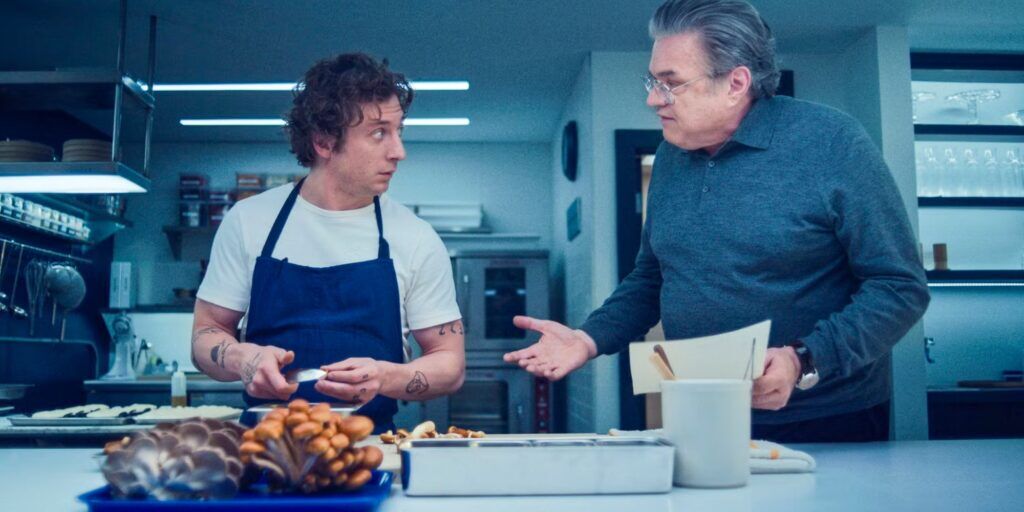The renowned show’s newest season is carving a new, feminist path for recognition of women-led workplaces, in spite of a history of white, male dominance.
FX on Hulu markets its hit series, The Bear, as a show “about food, family and the insanity of the grind.”
At the heart of “the insanity” is Carmen Berzatto (Jeremy Allen White), the owner and head chef of The Bear, an upscale Chicago restaurant.
Carmen’s exacting standards, combined with decades of working in hierarchical kitchens, shape his approach to leadership. During seasons 1-3, Carmen’s leadership style, steeped in aggressive masculinity, creates a difficult, unsustainable and often abusive work environment.
Carmen and those around him justify this approach because of the chef’s genius and ambitious goals to transform his late brother’s sandwich shop into a Michelin Star restaurant.
Yet, the recently aired fourth season reads as a (potential) turning point for the show.
The showrunners seem to be setting up a shift from a hypermasculine, destructive and abusive workplace (with Carmen as head owner/chef) to a more feminist workplace (with Sydney—Ayo Edebiri—taking on the head chef and partner role).
Power and Aggessive Masculinity
The Bear exemplifies a top-down power model, with Carmen firmly in charge. He makes all decisions with little input from others and frequently rejects innovative management ideas or dishes that colleagues propose (especially in seasons 1-3).
The restaurant is also patriarchal. Carmen runs the kitchen. Richie (Ebon Moss-Bachrach), a long-time family friend, manages the restaurant. Another family friend, Uncle J (Oliver Platt) provides financial backing with input from his business partner “Computer” (Brian Koppelman).
The Bear becomes a site of psychological harm with yelling normalized and burnout inevitable. These conditions resemble ‘grind culture,’ which excuses harmful behavior in the name of excellence.

This patriarchal, top-down power dynamic lets toxic masculinity overwhelm both staff and operations.
Carmen and Richie were raised in environments where masculinity is tied to emotional suppression and self-destruction, and they bring this history to The Bear. The two men frequently engage in shouting matches and belittle one another. Their inability to effectively communicate leads to dysfunction and critical restaurant reviews that threaten The Bear’s future.
Carmen’s leadership also takes a personal toll on the staff. Staff members internalize stress, suppress emotion and fear failure. The Bear becomes a site of psychological harm with yelling normalized and burnout inevitable. These conditions resemble “grind culture,” which excuses harmful behavior in the name of excellence.
While men make most of the decisions about the restaurant’s daily operations and future, women play a significant role in keeping The Bear afloat. Carmen’s sister Natalie (Abby Elliott) is the restaurant’s business manager, and Sydney is the sous-chef.

Sydney is a talented and visionary chef. Yet, Carmen routinely dismisses her proposed dishes and ideas for a more collaborative environment. When Carmen rejects Sydney’s dishes, he ultimately communicates she is not ready to take on a greater role in his kitchen.
Feminist Leadership
The showrunners seem to normalize and validate Sydney’s feminist leadership style. … With Sydney at the helm, a more inclusive, sustainable and healthier workplace seems possible for the staff at The Bear.
Sydney is gifted, creative and ambitious. The same descriptors apply to Carmen. Yet, as a leader, Sydney displays empathy and vulnerability and favors a shared leadership model.
Sydney’s journey is also shaped by her identity as a Black woman in the overwhelmingly white, male-dominated world of fine dining. Her character and storyline expose the patriarchal structures and racialized gatekeeping that often limit leadership opportunities in elite culinary spaces.
Carmen’s tunnel vision stops him from truly valuing Sydney as a leader who makes clear, timely and transparent decisions (in the kitchen) while creating a collaborative environment where others feel empowered to lead and contribute regardless of title.
Importantly, the showrunners seem to normalize and validate Sydney’s feminist leadership style. This potential narrative shift is exciting, as feminist leadership is too often undervalued, deemed unrealistic, or even criticized as evidence of “reverse discrimination.”
Toward a New Workplace
The final episode of season 4 points toward a major shakeup in the restaurant, with the showrunners ostensibly embracing a very different vision of labor and the workplace.
With Sydney at the helm, a more inclusive, sustainable and healthier workplace seems possible for the staff at The Bear.
Sydney’s self-awareness and a culture of care, empathy and power sharing may well transform depictions of work and leadership in The Bear.
Cultural depictions of feminist leadership, even when fictional, can help us both imagine and demand better. We need not settle for egotistical, unpredictable, manipulative leaders who focus on personal gains and grievances.
When viewers recognize and support more inclusive portrayals, we can help shift the cultural conversation about what strong, effective leadership looks like.
The Bear returns in 2026—at time when the United States urgently needs more models of transformative, feminist leadership. As The Bear models a more inclusive and accountable form of leadership, it challenges us to hold real-world leaders—from kitchens to boardrooms and Congress—to higher standards rooted in empathy, collaboration and care.
The Bear is available for streaming on:
Great Job Kate Schaab & the Team @ Ms. Magazine Source link for sharing this story.



